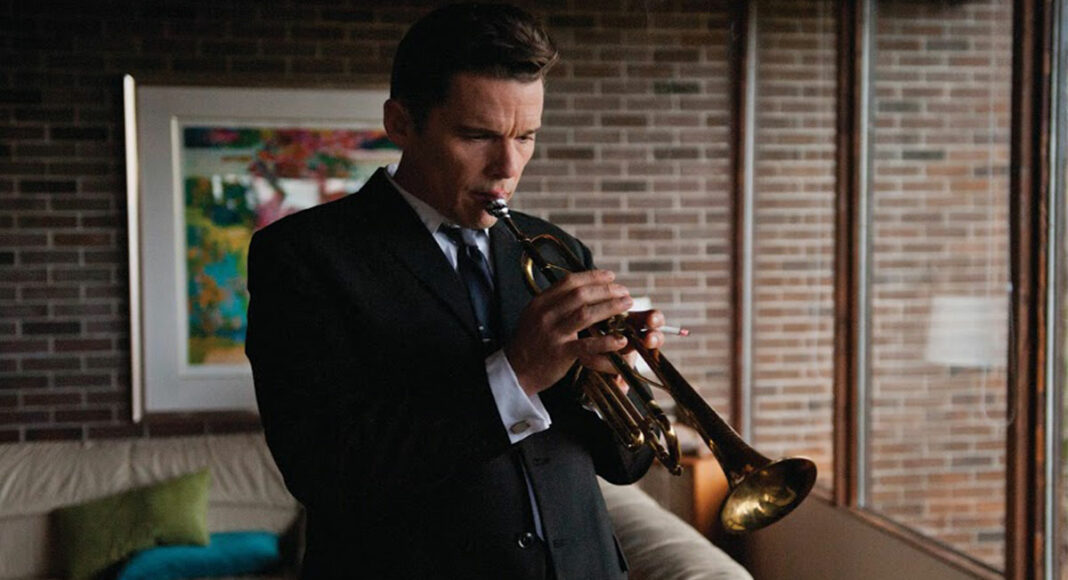The publicity for Robert Budreau’s Born to Be Blue calls it an “anti-biopic” on the troubled life of jazz trumpeter Chet Baker (now as famous as a lifelong heroin junkie as he once was as an icon of the cool West Coast jazz scene).
Instead of trotting out mundane and depressing facts, the filmmaker zeroes in on a crisis point in Baker’s life, then invents a fictive character to act as Baker’s muse, conscience and sounding board.
While most of what happens in their main story is not strictly true, Budreau tries to stay true to the essence of Baker through the process of invention—the way a jazz musician might improv his way through a familiar tune. It’s not a bad idea, but it might have worked better if Budreau’s stylings as a filmmaker were more dynamic. (Think of Bob Fosse, reimagining his own life in showbiz as a glitzy musical fantasia in All That Jazz.)
Budreau doesn’t quite muster up the same pizzazz; he mostly makes up stuff and presents it straight-faced, without revealing any more than a more truth-oriented telling would. Yes, there are moments when Ethan Hawke’s performance as Baker strikes just the right note of fragile, demon-haunted vulnerability—especially in the final act. But these moments are set in a larger story that takes too long to get going, and too often loses its way.
In 1966, Chet Baker (Hawke) is shivering through withdrawals in a jail cell in Italy when a Hollywood movie producer comes to see him. Flashback to 1954, a moody black-and-white sequence when youthful Chet, already a star on the West Coast, is playing at the famous Birdland jazz club in New York City for Miles Davis and Dizzy Gillespie. Between sets, nervous Chet takes a girl from the bar back to his dressing room; she introduces him to heroin just before his wife walks in on them.
All of which turns out to be a movie about Chet’s life in which he’s starring as himself. (Which must be the only way Budreau could think of to introduce scenes from Baker’s youth—a beautiful man known as “the James Dean of Jazz”—and still be played by 45-year-old Hawke.) There never was any such movie, nor was there a saucy young black actress named Jane (Carmen Ejogo), who plays his wife in the film-within-the-film.
But that doesn’t stop Budreau from turning her into the most sympathetic character in this movie. Sort of a composite of a black Frenchwoman Baker was attached to in the ’50s, and an English actress he married in the ’60s, Jane is warm, loyal and sensible. (In Budreau’s version, she even teaches Chet how to have better sex.) She stands by her man, even after a beating by drug dealers knocks out all his upper teeth, and Chet has to learn to play the trumpet all over again. This incident did happen, and Budreau uses it as a turning point for Chet to face his life.
But it would be nice to see (and hear) more of the young Baker in his prime. There’s hardly enough music in the first act to justify our interest, or to understand what he lost in giving in to drugs. But Baker was also a singer, and Hawke does a credible job approximating Chet’s sweet, stark, reedy tenor on “My Funny Valentine.”
But the movie Chet never emerges as a person of substance. Early on, Jane talks to somebody on the movie set, asking why so many women are attracted to Chet—even though he spends all of his pay on drugs and doesn’t have a place to live. It’s a question the movie never answers.
When Chet tries to romance Jane, chiefly by pawing her and trying to talk his way thorough her defenses, it’s kind of creepy; it’s creepier still when she capitulates so soon. Yes, women were always drawn to him, even after his good looks and stardom were gone. But Budreau can’t draw us in in the same way. He sticks to the surface of the Chet Baker mystique, without ever making us care about the man underneath.
BORN TO BE BLUE
**1/2 (out of four)
With Ethan Hawke and Carmen Ejogo. Written and directed by Robert Budreau. An IFC Films release. Rated R. 98 minutes.













